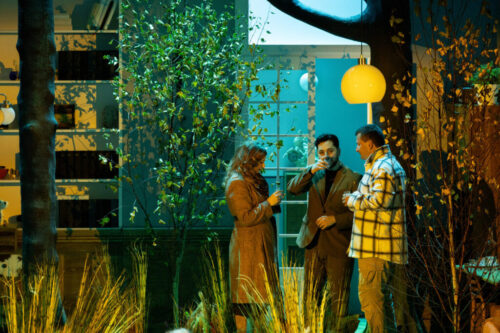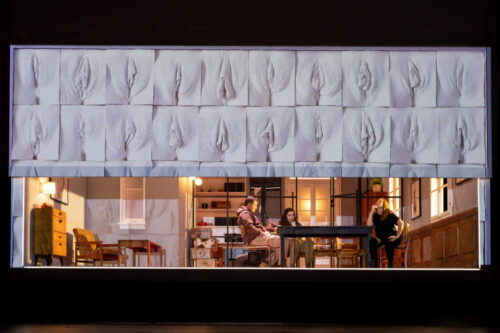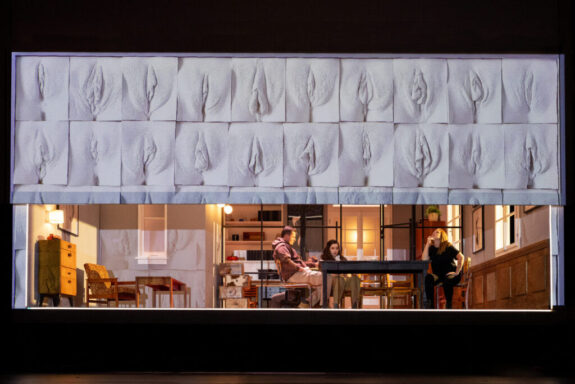 Czech Republic Festival Janáček Brno 2024 [1] – Jenůfa (1904 original version ed. Mark Audus): Soloists, Chorus and Orchestra of the Moravian Theatre Olomouc / Anna Novotná Pešková (conductor). Mahen Theatre, Brno, 22.11.2024. (GT)
Czech Republic Festival Janáček Brno 2024 [1] – Jenůfa (1904 original version ed. Mark Audus): Soloists, Chorus and Orchestra of the Moravian Theatre Olomouc / Anna Novotná Pešková (conductor). Mahen Theatre, Brno, 22.11.2024. (GT)

At the heart of this new production is the plight of women in society, a theme displayed in a full-frontal projection with a backdrop showing multiple female genitalia before the opera started and which was then raised somewhat. The ‘artwork’ was based on the British artist Jamie McCartney’s ‘The Great Wall of Vulva’ which is intended to draw attention to the women who go through plastic surgery on their genitals, often because of the porn industry. This prepared us ominously for what was to come.
As the programme informed, this production of Jenůfa was not only an attempt to examine the origins of Janáček’s music, but to examine the topic of motherhood from a contemporary perspective. The charitable organisation ‘A Mother’s Smile’ collaborated in the opera’s project, and the show involved non-professional performers who had suffered from pre-natal and post-natal depression. The programme told us that in the Czech Republic ‘A Mother’s Smile is absolutely critical to women’s mental health. During the ten years it has been in operation, it has managed to support thousands of mothers, but it still has a lot of work ahead of it, and today’s Jenůfa can help us with this.’ According to the project leaders: ‘We were interested in the personal life of Gabriela Preissová, who was completely crushed by the reaction to her drama […]. And then we projected our own – maternal – destinies onto all of this to some extent.’ Preissová’s play inspired Janáček’s Jenůfa.
In Preissová’s own words, ‘the literary field was a sanctuary for me – where horror and lamentation, passion and crime are allowed in the poet’s images – honest judgements of taste, principles, impressions – that is what I thought before. And now I know that if I set foot on that field, ugliness will crawl at my feet […] I it has a little value, it will survive the years – otherwise, to hell with it.’
The director of Jenůfa Veronica Kos Loulová studied at the Academy of Performing Arts in Prague, and in 2015 founded the artistic group RUN OPERUN and has led numerous successful projects exploring new ideas in opera and wrote the Zabijačka opera which was commissioned by the Czech government during the Czech Republic’s presidency of the European Union. Since 2022, Loulová has been the director of the Moravian Theatre in Olomouc – the youngest opera director in Europe.
Loulová writes, ‘Jenůfa accompanied me from the first months of my pregnancy and the premiere is to take place when my child will be almost a year and a half old. The female collective of the production team gave me the opportunity of processing all the frustrations and joys and prioritising the experience lived by myself and other women, mothers, non-mothers, daughters, victims… Raising this topic at an international festival as Janáček Brno fills me with immense satisfaction. The hope for our future, as a future that is empathetic and uplifting for the underprivileged, is fulfilling, and I know that culture is often the first thing to move things forward.’

Before the performance began, two ladies dressed in nineteenth century dress walked around the auditorium, and before the first bars, entered the stage disappearing into the rear – we were to see their contribution to the performance at the very end. At the opening of Act I, the action took place in the living room of a modern village house with a table and several chairs in the centre with a bed in the corner and windows overlooking the garden, with trees outside and above the house. The opening scene revealed Jenůfa, Kostelnička, Laca and two friends Karolka and Barena.
The setting of Act II was again of the home with rearranged furniture with Jenůfa asleep in her bed, an off-putting introduction into the central part of the act was a voice offstage heard through the loudspeakers relating the afflictions of women going through birth in a monotonous dictation which was disturbing. This ended and the music started again. The set of Act III again had the village home at its centre with a garden in front at the core of the action, and at the end, the women gather together embracing in sharing their tragic fates before the final terrible climax.
Of the principal singers, the finest singing and portrayal of the evening was the Kostelnička of Eliška Gattringerová – she has a strong and powerful soprano and embraced complete mastery of her tragic role. The Jenůfa of Barbora Perná was a little underwhelming in this challenging role, her soprano was a little weak in the high notes, yet she provided a convincing portrayal of the title role. Josef Moravek’s Laca at times exhibited outstanding singing, especially in Act I, yet sometimes lacked projection, however his acting was exceptional. The finest male voice of the evening was the Števa of Raman Hasymau – a fine vibrant tenor and with excellent characterisation. The secondary roles were finely portrayed – but both Karolka and Barena had little to do or sing in this staging, this opera is mostly around the four main characters.
Irina Moscu’s sets were simple in invoking a timeless period, while the costumes were colourful with greens and browns to the fore in this country setting. The choreography was well enacted, and the cruelty of Jenůfa’s tragedy was accentuated with Laca playing with items of ladies’ underwear in revealing Jenůfa’s tragic and oppressed state as he displayed them to the villagers. The folk dancing by the village folk seemed bizarre and appallingly caustic in the social stigma of Jenůfa’s plight. In a departure from the text of the opera, at the finale, a child runs on stage embracing Jenůfa and this was bewildering for the audience.
The orchestra was of chamber size with about forty musicians, which did not always rise to the dramatic requirement of Janáček’s score, lacking weight and dramatic power, yet was very skilfully directed by Anna Novotná Pešková in evincing the most expressive moments of the score.
The opera ended strangely after the tremendous orchestral conclusion, the two ladies walked on the stage accompanied by technicians who placed electronic keyboards and began singing a song by the rock band VIAH. This completely spoiled the ending, and regrettably left one with an adverse opinion of this innovative staging. For this writer, Janáček’s opera is one of the most terribly heart-breaking operas in which all the horror of societal oppression against women is openly expressed, for me this should be portrayed through the music and performance – not through peripheral means which can be considered to be stunts.
Gregor Tassie
Production:
Director – Veronica Kos Loulová
Musical study – Anna Novotná Peškova
Dramaturgy – Marta Ljubková
Set and Costume design – Irina Moscu
Lighting design – Fiammetta Baldiserri
Chorus master – Michael Dvořák
Assistant to the conductor – Anna Svoboda
Musical preparation – Milda Jedličková, Lucie Kaucká
Cast:
Jenůfa – Barbora Perná
Kostelnička – Eliska Gattringerová
Laca Klemeň – Josef Moravec
Števa Buryja – Raman Hasymau
Grandmother Buryjovka – Sylva Čmugrová
Stárek – Jiří Příbyl
Karolka – Helena Beránková
Barena – Anna Moriová
